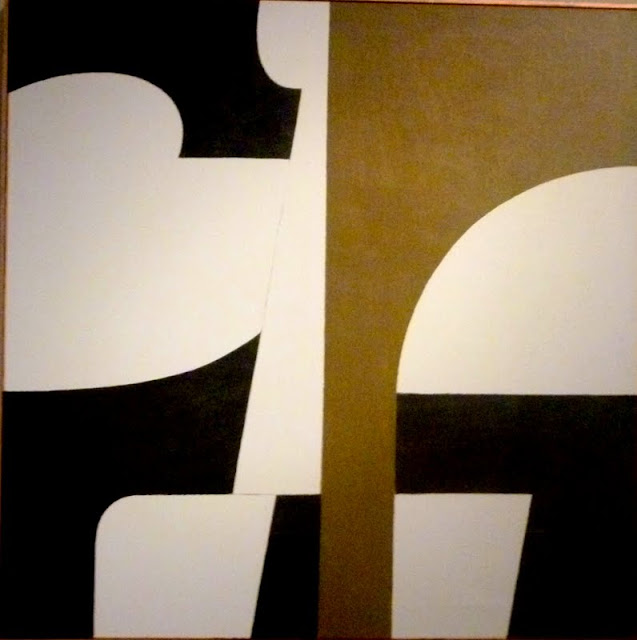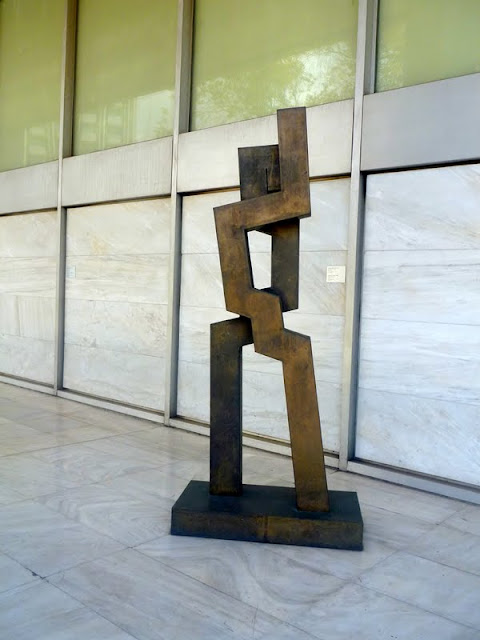An exhibition of Yannis Moralis' work at the National Gallery. A retrospective and a celebration.
The early work:
"I did not want to make imitations. Nor did I close my eyes. I let influences enter, but I did not want to imitate anyone. For instance in my self-portrait with Nikolaou, of 1937, you can see the influence of the great Italian Renaissance artists I saw in the museums in Rome. Similarly when I painted my self-portrait of 1938, in Paris, I later came to realize that it is 'related' to a self-portrait by Delacroix"
and a photograph of the artist
Pregnant Woman, 1948
The table, 1947
Portrait of Ioanna Lourou, 1940
Figure, 1951
A.G. Prokopiou in 'Art Review Notes' wrote: "This large composition unfolds in the two dimensions of the flat surface of the canvas and could be considered as a preliminary study for the wall decoration of a cenotaph. It has a few weaknesses: the front arm is slimmer, and the fact that it is parallel to the other arm causes a certain monotony. The back line of the background cuts through the surface of the second blue plane. The blue area may be bitter. Yet, these reservations do not compromise the merit of Moralis' work. His drawing is fine as always, and the way his figures are arranged in space, testifies to the artist's fine taste. His constant fluctuation between realism and modern art is often justified by his restless talent".
Figure, 1951
And now to the middle period
and the funerary compositions, which touch me to the core.
Funerary Composition, 1958
"One of my first funerary compositions came to me in a dream"
I find them incredibly moving but they are also good examples of the transition Moralis made from figurative to abstract painting.
Funerary Composition III, 1958-63
Funerary Composition V, 1963
"Love and death go together. Both have played an important role in my life".
Summer, 1968
I am imbued with the Ionian Sea. We belong to the Ionian Sea. There is another kind of light there. A sweeter, softer light....I love greys, I do not know why. I have always aspired to painting in the colours of the partridge.
when he moved to geometric stylisation incorporating curves.
and a photograph of the artist during that period
Erotic, 1982
Dialogue, 1974
Dialogue, 1982
Summer, 1995
Aigina, 1974
Untitled, 2001
Angel, 1979
Erotic, 2001
Girl untying her sandal, 1973
Contemplation, 2007
Abstract, 1991
Figure I, 1978
Erotic, 1994
"An artist expresses himself through the wounds of his era".
One of his sculptures at the entrance of the National gallery.
Finally, even though it is not part of this exhibition, the engraving he designed for the side of the Hilton, which is next to the gallery.
When I started this post, I was intending to select just a few highlights, as I normally do, as a reminder. This has turned out to be a virtual tour however - there was so much I wanted to be reminded of....








































Looks as if there are some charming possible candidates for MissingPortraits.info!
ReplyDeleteAre you working in Picasa to finish these photos? If so, try "tuning" and then increase "shadows" to see if it takes that slightly light glaze off the photographs, the paintings may be faded but I am sure not quite as faded as they are taken here without flash cos of gallery conditions.
ReplyDeleteLove the girl untying her sandal...that's the one I'd take home.
We've got a girl untying her sandal in a different form by a different artist. I thought we might have bought this one too - perhaps have to sell the house to buy it - but decided the flat might get too cluttered and we'd be homeless. My favourite is the Can Can.
ReplyDelete